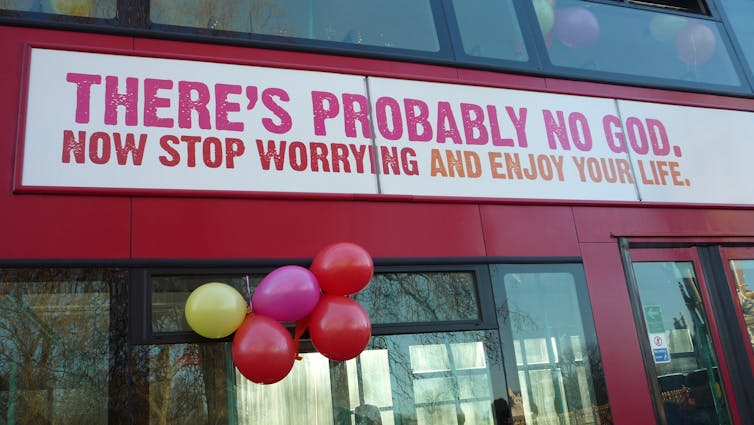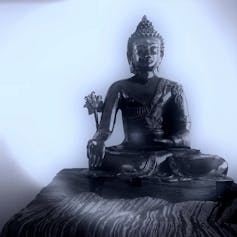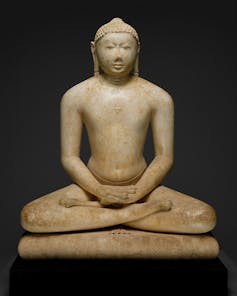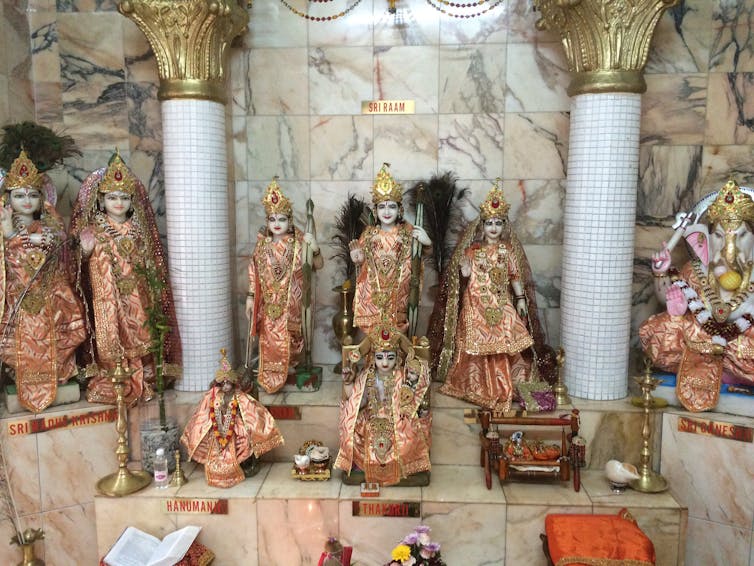
Atheism is not a modern concept. Zoe Margolis, CC BY-NC-ND
Signe Cohen, University of Missouri-Columbia
A group of atheists and secularists recently gathered in Southern California to talk about social and political issues. This was the first of three summits planned by the Secular Coalition for America, an advocacy group based in Washington D.C.
To many, atheism – the lack of belief in a personal god or gods – may appear an entirely modern concept. After all, it would seem that it is religious traditions that have dominated the world since the beginning of recorded history.
As a scholar of Asian religions, however, I’m often struck by the prevalence of atheism and agnosticism – the view that it is impossible to know whether a god exists – in ancient Asian texts. Atheistic traditions have played a significant part in Asian cultures for millennia.
Atheism in Buddhism, Jainism

While Buddhism is a tradition focused on spiritual liberation, it is not a theistic religion.
The Buddha himself rejected the idea of a creator god, and Buddhist philosophers have even argued that belief in an eternal god is nothing but a distraction for humans seeking enlightenment.
While Buddhism does not argue that gods don’t exist, gods are seen as completely irrelevant to those who strive for enlightenment.

A similar form of functional atheism can also be found in the ancient Asian religion of Jainism, a tradition that emphasizes non-violence toward all living beings, non-attachment to worldly possessions and ascetic practice. While Jains believe in an eternal soul or jiva, that can be reborn, they do not believe in a divine creator.
According to Jainism, the universe is eternal, and while gods may exist, they too must be reborn, just like humans are. The gods play no role in spiritual liberation and enlightenment; humans must find their own path to enlightenment with the help of wise human teachers.
Other atheistic philosophies
Around the same time when Buddhism and Jainism arose in the sixth century B.C., there was also an explicitly atheist school of thought in India called the Carvaka school. Although none of their original texts have survived, Buddhist and Hindu authors describe the Carvakas as firm atheists who believed that nothing existed beyond the material world.
To the Carvakas, there was no life after death, no soul apart from the body, no gods and no world other than this one.
Another school of thought, Ajivika, which flourished around the same time, similarly argued that gods didn’t exist, although its followers did believe in a soul and in rebirth.
The Ajivikas claimed that the fate of the soul was determined by fate alone, and not by a god, or even by free will. The Ajivikas taught that everything was made up of atoms, but that these atoms were moving and combining with each other in predestined ways.
Like the Carvaka school, the Ajivika school is today only known from texts composed by Hindus, Buddhists and Jains. It is therefore difficult to determine exactly what the Ajivikas themselves thought.
According to Buddhist texts, the Ajivikas argued that there was no distinction between good and evil and there was no such thing as sin. The school may have existed around the same time as early Buddhism, in the fifth century B.C.
Atheism in Hinduism

While the Hindu tradition of India embraces the belief in many gods and goddesses – 330 million of them, according to some sources – there are also atheistic strands of thought found within Hinduism.
The Samkhya school of Hindu philosophy is one such example. It believes that humans can achieve liberation for themselves by freeing their own spirit from the realm of matter.
Another example is the Mimamsa school. This school also rejects the idea of a creator God. The Mimamsa philosopher Kumarila said that if a god had created the world by himself in the beginning, how could anyone else possibly confirm it? Kumarila further argued that if a merciful god had created the world, it could not have been as full of suffering as it is.
According to the 2011 census, there were approximately 2.9 million atheists in India. Atheism is still a significant cultural force in India, as well as in other Asian countries influenced by Indian religions.
Very interesting discussions and throwing light on what after all is a matter of beliefs by quoting the various school of thoughts, Ajivika, Carvaka, Mimamsa and Samkhya having its relevance in today’s times.
LikeLiked by 1 person
Thank you for this interesting discussion. But I would like to add a dimension to modern atheism that you rightly ignored: Modern atheism is a belief of western/white thought in opposition to Abrahamic religions. Like most things, white people tend to ignore the thoughts and beliefs of non-whites as being irrelevant to modern life. White atheists are not much different. Europe and her colonies were all that mattered. Even though many parts of the world have long-established societies, cultures, schools of thought, religions, etc., they are not taken into account. This is a very sad thing to say, yet it is very true. Unless you are an atheist in opposition to the gods of abraham and his descendents, your atheism does not count.
This is why I was so happy to find your post. It is precious to my heart to see other people enter this conversation, and lay claim to their (your) historical part in it. To go back in time beyond Eastern or Western schools of thought there was a time when everyone was an atheist, though the word was meaningless because gods had not been invented yet. But even when gods were first proposed, most people alive at the time rejected the idea. So now they were atheists, though still there was no need for a label because it would have described most people. It was the theists or deists that needed the label to distinguish themselves from others. As we know, those theists/deists/pantheists/etc eventually became the dominant groups, because it became easier to let some other entities be in charge of one’s life and be blamable than blaming oneself. And where white people dominated, that became the only concern, since non-whites were uneducated, or barbarians, or savages, or whatever. Listen to atheists in Europe, or North America, almost completely we are in opposition to the christian god, with some opposition to the hebrew god, and barely any discussion of the muslim god. We are the most ethnocentrist people in the world. And our atheists are no more enlightened than our theists, for the most part.
Thank you for showing us how ignorant we really are.
LikeLiked by 1 person
Thanks for taking the time to read the article, and adding a “dimention” to the debate in your comments. I agree that “our atheists are no more enlightened than our theists”. But, I think that is universally true. There is an article I wrote titled: Beyond The Confines Of Atheism And Theism, https://wordpress.com/post/promodpuri.com/4932, that might interest you. Another one: Composition of god in Hinduism https://wordpress.com/view/promodpuri.com.
LikeLike
I will look at them later. Thanks for the links. I am wondering more about you, and your background. Do you have a post about yourself?
LikeLiked by 1 person
Funny thing happened on my way to your links–I never got there. They took me to where I was invited to write posts of my own. Wires are crossed. Is it possible to correct them?
LikeLike
Please check out home page: https://promodpuri.com/, and https://progressivehindudialogue.com/2016/09/07/welcome/
LikeLike
Pl. try again: Beyond the confines of Atheism and Theism…https://wordpress.com/post/promodpuri.com/4932, Assembly of God…https://wordpress.com/post/progressivehindudialogue.com/51. My websites home pages are: promodpuri.com https://wordpress.com/view/promodpuri.com, and progressivehindudialogue.com https://wordpress.com/view/progressivehindudialogue.com
If these links do not work from here then copy and paste in google search. Sorry, I’m not that tech savvy.
LikeLike
Correction Hindu word is not found in Vedas. It is coined by muslims who cannot able to pronounce sindhu properly. This word hindu is sectarian in nature and it has nothing to do with sanatana dharma culture.
Ajivika, Carvaka, Mimamsa and sankya are not the vedic school of thought. Jains and Buddhist are not followers of vedic culture. So, actually there is many misconception in the name of Hindu. Many people think hindu means one who is a follower of Vedas generally. Actually the word hindu is not in Vedas it is varna ashrama.
So one who defies God and Vedas are atheists or outcaste people.
LikeLiked by 1 person
Thanks for your comment. I have dealt with the subject in my book Hinduism Beyond Rituals, Customs And Traditions under the History chapter
LikeLike